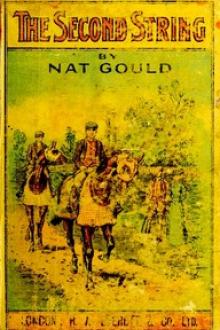Iron Throne by Ellen Gould-Harmon (readict .txt) 📕

- Author: Ellen Gould-Harmon
Book online «Iron Throne by Ellen Gould-Harmon (readict .txt) 📕». Author Ellen Gould-Harmon
Calvin had been educated for the priesthood. When only twelve years of age he had been appointed to the chaplaincy of a small church, and his head had been shorn by the bishop in accordance with the canon of the church. He did not receive consecration, nor did he fulfill the duties of a priest, but he became a member of the clergy, holding the title of his office, and receiving an allowance in consideration thereof. Now, feeling that he could never become a priest, he turned for a time to the study of law, but finally abandoned this purpose and determined to devote his life to the gospel. But he hesitated to become a public teacher. He was naturally timid, and was burdened with a sense of the weighty responsibility of the position, and he desired still to devote himself to study. The earnest entreaties of his friends, however, at last won his consent. "Wonderful it is," he said, "that one of so lowly an origin should be exalted to so great a dignity."--Wylie, b. 13, ch. 9.
Quietly did Calvin enter upon his work, and his words were as the dew falling to refresh the earth. He had left Paris, and was now in a provincial town under the protection of the princess Margaret, who, loving the gospel, extended her protection to its disciples. Calvin was still a youth, of gentle, unpretentious bearing. His work began with the people at their homes. Surrounded by the members of the household, he read the Bible and opened the truths of salvation. Those who heard the message carried the good news to others, and soon the teacher passed beyond the city to the outlying towns and hamlets. To both the castle and the cabin he found entrance, and he went forward, laying the foundation of churches that were to yield fearless witnesses for the truth.
A few months and he was again in Paris. There was unwonted agitation in the circle of learned men and scholars. The study of the ancient languages had led men to the Bible, and many whose hearts were untouched by its truths were eagerly discussing them and even giving battle to the champions of Romanism. Calvin, though an able combatant in the fields of theological controversy, had a higher mission to accomplish than that of these noisy schoolmen. The minds of men were stirred, and now was the time to open to them the truth. While the halls of the universities were filled with the clamour of theological disputation, Calvin was making his way from house to house, opening the Bible to the people, and speaking to them of Christ and Him crucified.
In God's providence, Paris was to receive another invitation to accept the gospel. The call of LeFevre and Farel had been rejected, but again the message was to be heard by all classes in that great capital. The king, influenced by political considerations, had not yet fully sided with Rome against the Reformation. Margaret still clung to the hope that Protestantism was to triumph in France. She resolved that the reformed faith should be preached in Paris. During the absence of the king, she ordered a Protestant minister to preach in the churches of the city. This being forbidden by the papal dignitaries, the princess threw open the palace. An apartment was fitted up as a chapel, and it was announced that every day, at a specified hour, a sermon would be preached, and the people of every rank and station were invited to attend.
Crowds flocked to the service. Not only the chapel, but the antechambers and halls were thronged. Thousands every day assembled--nobles, statesmen, lawyers, merchants, and artisans. The king, instead of forbidding the assemblies, ordered that two of the churches of Paris should be opened. Never before had the city been so moved by the word of God. The spirit of life from heaven seemed to be breathed upon the people. Temperance, purity, order, and industry were taking the place of drunkenness, licentiousness, strife, and idleness.
But the hierarchy were not idle. The king still refused to interfere to stop the preaching, and they turned to the populace. No means were spared to excite the fears, the prejudices, and the fanaticism of the ignorant and superstitious multitude. Yielding blindly to her false teachers, Paris, like Jerusalem of old, knew not the time of her visitation nor the things which belonged unto her peace. For two years the word of God was preached in the capital; but, while there were many who accepted the gospel, the majority of the people rejected it. Francis had made a show of toleration, merely to serve his own purposes, and the papists succeeded in regaining the ascendancy. Again the churches were closed, and the stake was set up.
Calvin was still in Paris, preparing himself by study, meditation, and prayer for his future labours, and continuing to spread the light. At last, however, suspicion fastened upon him. The authorities determined to bring him to the flames. Regarding himself as secure in his seclusion, he had no thought of danger, when friends came hurrying to his room with the news that officers were on their way to arrest him. At that instant a loud knocking was heard at the outer entrance. There was not a moment to be lost. Some of his friends detained the officers at the door, while others assisted the Reformer to let himself down from a window, and he rapidly made his way to the outskirts of the city. Finding shelter in the cottage of a labourer who was a friend to the reform, he disguised himself in the garments of his host, and, shouldering a hoe, started on his journey. Traveling southward, he again found refuge in the dominions of Margaret. (See D'Aubigne, History of the Reformation in Europe in the Time of Calvin, b. 2, ch. 30.)
Here for a few months he remained, safe under the protection of powerful friends, and engaged as before in study. But his heart was set upon the evangelization of France, and he could not long remain inactive. As soon as the storm had somewhat abated, he sought a new field of labour in Poitiers, where was a university, and where already the new opinions had found favour. Persons of all classes gladly listened to the gospel. There was no public preaching, but in the home of the chief magistrate, in his own lodgings, and sometimes in a public garden, Calvin opened the words of eternal life to those who desired to listen. After a time, as the number of hearers increased, it was thought safer to assemble outside the city. A cave in the side of a deep and narrow gorge, where trees and overhanging rocks made the seclusion still more complete, was chosen as the place of meeting. Little companies, leaving the city by different routes, found their way hither. In this retired spot the Bible was read aloud and explained. Here the Lord's Supper was celebrated for the first time by the Protestants of France. From this little church several faithful evangelists were sent out.
Once more Calvin returned to Paris. He could not even yet relinquish the hope that France as a nation would accept the Reformation. But he found almost every door of labour closed. To teach the gospel was to take the direct road to the stake, and he at last determined to depart to Germany. Scarcely had he left France when a storm burst over the Protestants, that, had he remained, must surely have involved him in the general ruin. The French Reformers, eager to see their country keeping pace with Germany and Switzerland, determined to strike a bold blow against the superstitions of Rome, that should arouse the whole nation. Accordingly placards attacking the mass were in one night posted all over France. Instead of advancing the reform, this zealous but ill-judged movement brought ruin, not only upon its propagators, but upon the friends of the reformed faith throughout France. It gave the Romanists what they had long desired--a pretext for demanding the utter destruction of the heretics as agitators dangerous to the stability of the throne and the peace of the nation.
By some secret hand--whether of indiscreet friend or wily foe was never known--one of the placards was attached to the door of the king's private chamber. The monarch was filled with horror. In this paper, superstitions that had received the veneration of ages were attacked with an unsparing hand. And the unexampled boldness of obtruding these plain and startling utterances into the royal presence aroused the wrath of the king. In his amazement he stood for a little time trembling and speechless. Then his rage found utterance in the terrible words: "Let all be seized without distinction who are suspected of Lutheresy. I will exterminate them all.-- Ibid., b. 4, ch. 10. The die was cast. The king had determined to throw himself fully on the side of Rome.
Measures were at once taken for the arrest of every Lutheran in Paris. A poor artisan, an adherent of the reformed faith, who had been accustomed to summon the believers to their secret assemblies, was seized and, with the threat of instant death at the stake, was commanded to conduct the papal emissary to the home of every Protestant in the city. He shrank in horror from the base proposal, but at last fear of the flames prevailed, and he consented to become the betrayer of his brethren. Preceded by the host, and surrounded by a train of priests, incense bearers, monks, and soldiers, Morin, the royal detective, with the traitor, slowly and silently passed through the streets of the city. The demonstration was ostensibly in honour of the "holy sacrament," an act of expiation for the insult put upon the mass by the protesters. But beneath this pageant a deadly purpose was concealed. On arriving opposite the house of a Lutheran, the betrayer made a sign, but no word was uttered. The procession halted, the house was entered, the family were dragged forth and chained, and the terrible company went forward in search of fresh victims. They "spared no house, great or small, not even the colleges of the University of Paris. . . . Morin made all the city quake. . . . It was a reign of terror." -- Ibid., b. 4, ch. 10.
The victims were put to death with cruel torture, it being specially ordered that the fire should be lowered in order to prolong their agony. But they died as conquerors. Their constancy were unshaken, their peace unclouded. Their persecutors, powerless to move their inflexible firmness, felt themselves defeated. "The scaffolds were distributed over all the quarters of Paris, and the burnings followed on successive days, the design being to spread the terror of heresy by spreading the executions. The advantage, however, in the end, remained with the gospel. All Paris was enabled to see what kind of men the new opinions could produce. There was no pulpit like the martyr's pile. The serene joy that lighted up the faces of these men as they passed along . . . to the place of execution, their heroism as they stood amid the bitter flames, their meek forgiveness of injuries, transformed, in instances not a few, anger into pity, and hate into love, and pleaded with resistless eloquence in behalf of the gospel."--Wylie, b. 13, ch. 20.
The priests, bent upon keeping the popular fury at its height, circulated the most terrible accusations against the Protestants. They were charged with plotting to massacre the Catholics, to overthrow the government, and to murder the king. Not a shadow of evidence could be produced in support of the allegations. Yet these prophecies of evil were to have a fulfillment; under far different circumstances, however, and from causes of an opposite character. The cruelties that were inflicted upon the innocent Protestants by the Catholics accumulated in a weight of retribution, and in after centuries wrought the very doom they had predicted to be impending, upon the king, his government, and his subjects; but it was brought about by infidels and by the papists themselves. It was not the establishment, but the suppression, of Protestantism, that, three hundred years later, was to bring upon France these dire calamities.
Suspicion, distrust, and terror now pervaded all classes of society. Amid the general alarm it was seen how deep a hold the Lutheran teaching had gained upon the minds of men who stood highest for education, influence, and excellence of character. Positions of trust and honour were suddenly found vacant. Artisans, printers, scholars, professors in the universities, authors, and even courtiers, disappeared. Hundreds fled from Paris, self-constituted exiles from their native land, in many cases thus giving the first intimation that they favoured the reformed faith. The papists looked about them in amazement at thought of the unsuspected heretics that had been tolerated among them. Their rage spent itself upon the multitudes of humbler





Comments (0)